by Ting | Sep 11, 2016
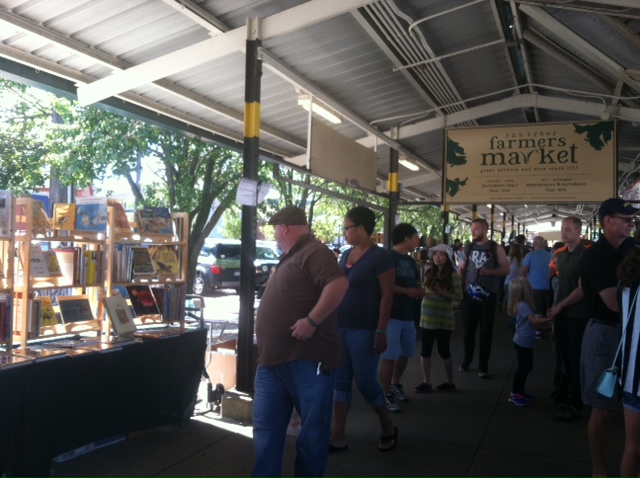
Kerrytown Book Fest
After submitting my application to residency today, I went to the Kerrytown Book Fest and made some acquisitions:
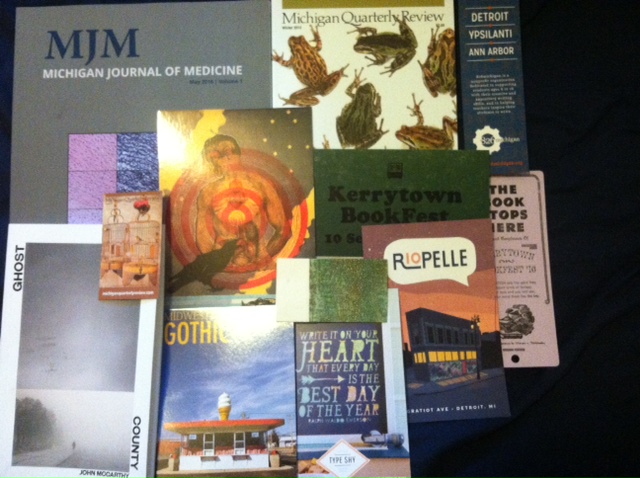
My acquisitions
(and by acquisitions, I mean a lot of this stuff was for free)
Ann Arbor is paradise for literature lovers, from books festivals like this one to the Ann Arbor Poetry Slam (every 1st and 3rd Sunday of each month) at Cafe Royale on State Street to readings at the local bookstore Literati and events at the University of Michigan Museum of Art. I also learned about letter pressing today, which was really neat:
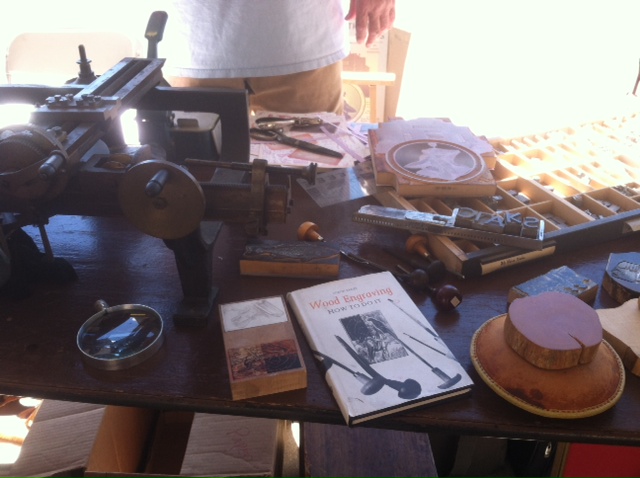
Letter pressing kit
During my four years here as a medical student, I’ve had the opportunity to not only keep up with my writing, but to expand my horizons. I am applying to residency in psychiatry, and my interests are two-fold. I want to use poetry to explore the relationship between memory and identity, which has captured my fascination ever since M2 year, when I first interacted with a patient with dementia. In addition, I want to use language to change behavior. On my substance use disorder elective this month, I’ve had the chance to practice motivational interviewing, a method of guiding patients towards naming their own reasons and setting their own goals for changing their behavior.
In residency, I hope to incorporate medical humanities into my daily interactions with patients, helping to articulate the ways in which art and literature could be used to improve patient care. In the meantime, I can’t wait for what the rest of M4 year brings!
-Ting
Ting Gou is a fourth-year M.D. candidate at the University of Michigan Medical School, interested in psychiatry. Her first collection of poems, The Other House, is forthcoming this November from Blue Lyra Press. As a student in the IMPACT pilot program, she is working on her second poetry collection, inspired by patients with memory loss. When she is not seeing patients, she is either writing/reading/editing poetry or attending one of the many literary events in Ann Arbor. Connect with her on Twitter @tinggou.
by Ting | Jun 30, 2016
Poetry.
Before you skip over this post because of the previous sentence, I want you to think about something that fascinated you far more than you thought it would. That’s what I think poetry is for most people: that interesting thing that they never knew existed. I truly, maybe a little naively, believe that those who don’t like poetry just haven’t been exposed to the poems that they would like. And there’s a lot of poetry out there, far more than what the volumes on that one shelf at your nearest major book retailer might suggest. (I had originally titled this post “The poetry section at major bookstores makes me really sad,” but then I realized that THAT was one way to make sure no one reads this post!)
I recently finished Step 2. I’m officially an M4 now. Like the characters in the title short story I recently read from Anthony Doerr’s amazing 2002 collection The Shell Collector, who are bitten and rendered briefly comatose by a venomous sea snail, I’m in shock. I took Step 2 on Monday, and for the past three days, all I’ve done is read (I’m on my vacation month). They say that there are two types of people: those who read to remember, and those who read to forget. What about those who read to figure out what they want to do for the rest of their lives? In which camp do the nuances of that desire fall?
In truth, I know what my next four years will look like. I am ecstatic to have found, through my M3 year, the medical field that I will go into. I also know that I will be writing poetry. And here is where a less stubborn version of myself might throw up her hands and say, “This- this is not happening” — “This” meaning a career path that lets me combine my love of medicine and poetry into something that (can I say this without sounding completely delusional) could be helpful to both fields. I can’t say that it’s been easy so far– being a medical student and a writer. “I’m a poet” is not something that I volunteer on the wards, mostly because that’s like randomly telling people that you love kayaking or have a fondness for turtles in the middle of a conversation about your career ambitions. Because, despite the successful integration of creative pursuits and medical careers by physician-writers such as Atul Gawande, Amit Majudar, C. Dale Young, Rafael Campo, and so many, many more, creative writing is still seen as being separate from medicine, as evidenced by the furrowed brows and blank stares I’ve received on clerkships in response to the phrase “I write poetry” (sometimes also to the phrase, “I like to write,” at which point I’m like, This…is going to be a long two weeks). When I’m feeling adventurous, I will tell attendings or residents that I write poetry, but for the most part, I don’t bring it up unless asked about hobbies or interests outside of medicine (and instead use my energy to plan events that integrate medicine and the arts, like this one with the poet and internist Rafael Campo back in March: http://www.literatibookstore.com/event/site-humanism-and-ethics-night) Small but gradual change!
What this gap between medicine and the arts boils down to, for me, is an awareness gap. Just as you might hypothetically think that all the poetry in the world is of one homogeneous note if you only consider the poems in your high school literature textbook (was going to write, “the poetry section at the major book store,” but then realized that probably NO ONE besides writers look at, and cry over, that section), so might physicians, when it comes to possibilities within a medical career. What does this mean for me, an M4? As I go through this year, I hope to continue to work with the Medicine and the Arts Program to plan events that bring physicians and medical students together with writers. I’ll work on my IMPACT project, a collection of poems about dementia (more about that in a later post). I’ll mentor some of my peers within the Medical Humanities Path of Excellence, for which I’m planning a lesson that involves reflection and writing. I’ll continue to learn, and think, and write. It’s unfamiliar territory for most, but that’s what makes it exciting–at least, definitely, to me!
~
Ting Gou is an M4. Her first collection of poems, The Other House, is forthcoming in the Delphi Poetry Series from Blue Lyra Press this November. Her poems have been nominated for the Pushcart Prize three times and can be found in various literary and medical journals.
Ting Gou is a fourth-year M.D. candidate at the University of Michigan Medical School, interested in psychiatry. Her first collection of poems, The Other House, is forthcoming this November from Blue Lyra Press. As a student in the IMPACT pilot program, she is working on her second poetry collection, inspired by patients with memory loss. When she is not seeing patients, she is either writing/reading/editing poetry or attending one of the many literary events in Ann Arbor. Connect with her on Twitter @tinggou.
by Ting | Jan 1, 2016
Yesterday, I fell asleep to the sound of exploding fireworks from neighbors’ lawns. It felt unbelievably good to be back home in Georgia with my family. One of the neighbors placed firecrackers in a ring on their driveway, lit them one by one. As the fireworks went off, the children, each holding a sparkler, lined up in front of the garage. I could only imagine what the picture taken of that night would look like for them — an array of multicolored sparks lighting up their faces, the rest of their bodies invisible. Little fires hissed in the dark.
Confession: I’ve been afraid of loud noises for forever. When I was three, I carried a large balloon up the staircase in my grandma’s apartment. The balloon caught on some metal and exploded. I think that’s when the fear started. Isn’t it strange how we still remember certain things from our childhood? Being with family means that I have been thinking more about memory recently. You can read about what I have to say about memory in my interview with the literary magazine r.kv.r.y.(pronounced recovery) http://rkvryquarterly.com/interview-with-ting-gou/
I’ve also been thinking more about memory because I just finished my neurology rotation, during which I took care of patients with dementia. When we create our identities from the memories of ourselves, what happens when we can no longer remember? On some level, I guess I’ve been exploring this question ever since I started writing poetry in high school. The idea that you have to create an identity when one isn’t available to you is what drew me to poetry in the first place. During my M2 year, I first started approaching this question from the perspective of a healthcare provider. I took an M2 elective that gave students the opportunity to talk to a patient with dementia. The patient that I talked to happened to be a painter, and she told me about how her art has changed throughout the progression of her dementia. Not worse, just different. Her story–the idea of taking something that is unraveling your identity and transforming it into new material for your art–led me to write a poem that explored the relationship between her painting and Penelope’s weaving and unweaving. How the act of unraveling was an act of hope for Penelope, how losing her identity in one way helped my patient find another identity. You can read my poem in the latest issue of JAMA http://jama.jamanetwork.com/article.aspx?articleid=2478206
To remember something is to explore the past, because memories are imperfect. But I do believe that the way in which our memories are imperfect is useful, as I mention in r.kv.r.y. I can’t say if my neighbors will remember the fear of the fireworks more than the excitement (though I doubt even the children carry a greater phobia of balloons and loud noises than I do), but perhaps what they do remember the best will be a reflection of what was really important about that memory to begin with. For me, I will remember how I watched the fireworks despite being terrified of the noise. Everywhere, things were exploding. And it was beautiful.
-Ting
Ting Gou is a fourth-year M.D. candidate at the University of Michigan Medical School, interested in psychiatry. Her first collection of poems, The Other House, is forthcoming this November from Blue Lyra Press. As a student in the IMPACT pilot program, she is working on her second poetry collection, inspired by patients with memory loss. When she is not seeing patients, she is either writing/reading/editing poetry or attending one of the many literary events in Ann Arbor. Connect with her on Twitter @tinggou.
by Ting | Jul 12, 2015
It’s important to me to take time to self-reflect. After studying today, I walked to the river by my apartment to read and write. Some poets recently made me aware of an extensive list of poetry books related to medicine and illness, and I carried three of them with me to the riverbank:
Poetry in Medicine: An Anthology of Poems About Doctors, Patients, Illness, and Healing, edited by Michael Salcman
Scissored Moon, by Stacy R. Nigliazzo
and Little Spells, by Jennifer K. Sweeney
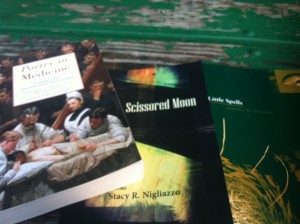
I had already read Little Spells in its entirety–the poems are stunning–but I brought it with me because I am obsessed with it. I was less familiar with the other two books, but I was eager to dive in. There’s something about being by a river that encourages me to look through the perspective of someone else. Maybe it’s the sound of the running water, constantly in the background, reminding me that I am a small part of something beautiful. The smell of summer leaves, fiercely green. The playground off to my left, rattling with little feet.
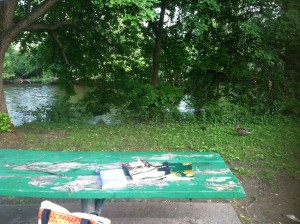
After reading some remarkable poems in these books, I took out my poetry journal (which also doubles as a random notes journal sometimes when I’m out of paper) and began revising an old poem, something I had written as part of my creative writing thesis back in college. In the process of editing it, I couldn’t help but consider the relevance of some aspects of poetry to my current life as a medical student. For one, I had submitted the poem I was revising four or five times already to different literary magazines, and it had been rejected by all of them. Of course, everyone is familiar with rejections, but I think few people deal with rejections more frequently than writers–you put your heart into your work, you put your work out there, but you know in your heart that it will probably be rejected. Given that most literary magazines have an acceptance rate between 1 and 10%, you submit work to multiple places, meaning that every other week, you will probably be getting a rejection: “Dear Ting, thank you for sending us your work. However, at this time, we’ll have to pass on these pieces….” When I get these emails now, of course I’m a little disappointed, but I see each one as a chance to revise the poem at a later date (I’ve told myself that if I really believe that a piece should stay exactly as is, I won’t revise it, but that has yet to happen). Sitting by the river, revising this poem, I’m thinking about all the things I can improve on in terms of my current M3 Ob/Gyn clerkship for this upcoming week, realizing that becoming a better physician requires a similar mindset as the one needed to continue writing despite rejections–one of humility, one that trusts the process of practice, one that looks forward to challenges.
As I’m revising the poem, I’m also thinking about the importance of seeing things from the perspective of someone else. Given that I first wrote this poem over five years ago, it’s like I’m reading it as someone else, and not as the person who wrote it. I can look at it more objectively. I’m not as influenced by my own memories, thoughts, experiences. As medical students and future physicians, shouldn’t we take the time to step outside of ourselves, shed our medical jargon, see the situation from the perspective of the patient? I often think about this when I’m revising poetry, especially if it’s something I haven’t touched for a couple months.
I started this post wanting to just share some pictures of a lovely hour spent by the river, but clearly things circle back to poetry for me. I think I’m drawn to poetry for the same reason I’m drawn to medicine–they are both fields that require complex sets of skills in which success is measured as the ability to connect with someone else. Maybe if I get good enough, I’ll be able to heal. I think I’ll leave this note with a few images:
By my spot on the river, there is a quaint-looking structure, blue and white stucco. As inviting as it looks from the outside, it’s completely empty inside. Concrete walls, concrete floor. No chairs, no table. You could see it as a desolate place, just as you can see an unfinished poem, an unmastered skill as a source of frustration. But just as easily, I think, you can see it as a place for reflection, for growth. Just because there are no chairs doesn’t mean that you can’t sit down. Just because there is no door swinging on a hinge doesn’t mean there’s no door.

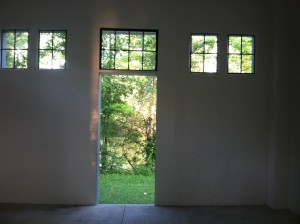
Ting Gou is a fourth-year M.D. candidate at the University of Michigan Medical School, interested in psychiatry. Her first collection of poems, The Other House, is forthcoming this November from Blue Lyra Press. As a student in the IMPACT pilot program, she is working on her second poetry collection, inspired by patients with memory loss. When she is not seeing patients, she is either writing/reading/editing poetry or attending one of the many literary events in Ann Arbor. Connect with her on Twitter @tinggou.
by Ting | Jun 21, 2015
A few weekends ago, I had the opportunity to attend the Bear River Writers’ Conference in northern Michigan. Living in a cabin by a lake, writing and workshopping poetry, meeting writers in Ann Arbor, connecting with the MFA faculty at Michigan, kayaking, talking writing by a bonfire–a complete dream during the entire 3 days I was there. It started with my writing a 3-page email, as early as I could (6 months in advance), to my clerkship director explaining the importance of this conference to my medical education (see my previous post). A few weeks later, I learned I was approved for a Friday absence that would allow me to attend the conference. With Walloon Lake as a backdrop, a hot cup of tea on the table, I wrote my first poems since February/March.
I met some really cool people, some of them writers here in Ann Arbor. Here’s a picture of me and Allison, who was part of my workshop and who’s also an editor at the University of Michigan Press.
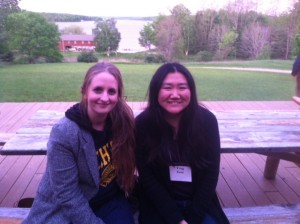
And the nightly bonfire by Walloon Lake
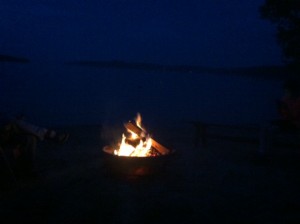
Poetry, like medicine, is not a solitary endeavor. Just as you can’t grow in your doctoring skills on your own, you can’t become a better poet without feedback, guidance, and not a little stealing inspiration from great writers! I’m really grateful to Bear River, Michigan’s MFA program, and, of course, UMMS for giving me this opportunity to sharpen my skills in this highly human craft.
Ting Gou is a fourth-year M.D. candidate at the University of Michigan Medical School, interested in psychiatry. Her first collection of poems, The Other House, is forthcoming this November from Blue Lyra Press. As a student in the IMPACT pilot program, she is working on her second poetry collection, inspired by patients with memory loss. When she is not seeing patients, she is either writing/reading/editing poetry or attending one of the many literary events in Ann Arbor. Connect with her on Twitter @tinggou.









